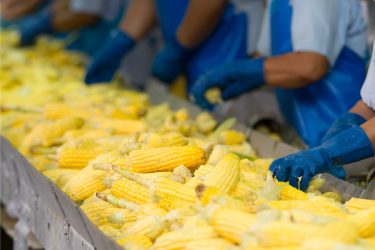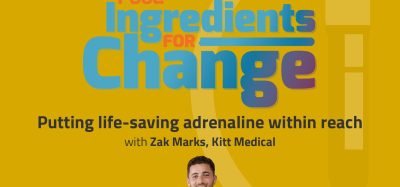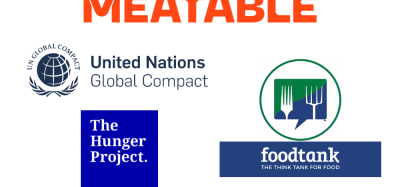Safety in the face of a pandemic
- Like
- Digg
- Del
- Tumblr
- VKontakte
- Buffer
- Love This
- Odnoklassniki
- Meneame
- Blogger
- Amazon
- Yahoo Mail
- Gmail
- AOL
- Newsvine
- HackerNews
- Evernote
- MySpace
- Mail.ru
- Viadeo
- Line
- Comments
- Yummly
- SMS
- Viber
- Telegram
- Subscribe
- Skype
- Facebook Messenger
- Kakao
- LiveJournal
- Yammer
- Edgar
- Fintel
- Mix
- Instapaper
- Copy Link
Posted: 25 June 2020 | Bethan Grylls (New Food) | No comments yet
New Food’s Editor discovers how some major players in the market are protecting their employees during the COVID-19 crisis and the concerns some have expressed over food supply and safety.


With the threat of a highly contagious, life-threatening virus looming over us, the food industry is witnessing unprecedented pressure from all angles. However, the world must continue to have access to a safe supply of food. It is, therefore, imperative that these challenges do not compromise the safety of our key workers or the food we eat.
Virus transmission
We currently have limited information about COVID-19, but so far there is no indication* that the virus is transmitted by the ingestion of food; with public health officials yet to find such a case. Experts are also looking to historical outbreaks of related coronavirus, such as SARS and MERS, for guidance. In both instances, transmission did not occur via food consumption.1
According to the World Health Organization (WHO), studies suggest that the virus can live for several hours – even up to several days – on surfaces, depending on the type of material and the conditions it is exposed to (eg, temperature).
With the threat of a highly contagious, life-threatening virus looming over us, the food industry is witnessing unprecedented pressure from all angles. However, the world must continue to have access to a safe supply of food. It is, therefore, imperative that these challenges do not compromise the safety of our key workers or the food we eat.
Virus transmission
We currently have limited information about COVID-19, but so far there is no indication* that the virus is transmitted by the ingestion of food; with public health officials yet to find such a case. Experts are also looking to historical outbreaks of related coronavirus, such as SARS and MERS, for guidance. In both instances, transmission did not occur via food consumption.1
According to the World Health Organization (WHO), studies suggest that the virus can live for several hours – even up to several days – on surfaces, depending on the type of material and the conditions it is exposed to (eg, temperature).
If the studies are accurate, this is far less time than most common foodborne germs can survive on surfaces, including norovirus, which can live for weeks on surfaces and even survive freezing and heating.2
“When someone starts coughing, the chance of producing airborne droplets that can be inhaled, particularly for those working in confined spaces, massively increases”
The critical thing to remember with COVID-19 is that “virus entry has to be via direct contact with a mucus membrane in the eyes, nose or mouth,” explained Robert Verkerk, co-director of ANH Consultancy and Founder of the Alliance for Natural Health International.
An infected individual could potentially transfer their respiratory droplets onto a surface by coughing or sneezing, but the most common form of transmission is person-to-person. Therefore, as Frank Yiannas, Deputy Commissioner for Food Policy and Response at the US Food and Drug Administration (FDA), announced in a recent press conference, food products need not be recalled in the event that someone in the workplace is confirmed as COVID-19 positive.
However, it is imperative for good hygiene practices to be observed at all times, and food business operators must continue to follow the relevant standards and regulations. Employers should also affirm the importance of frequent handwashing, with employees taking note of the 20 second handwashing rule.
Keeping up with demand, while keeping safe


Food plant workers are usually shoulder-to-shoulder, so implementing social distancing may prove a difficult task
“There is a lot of pressure on the industry right now to keep operating and keep up with higher demand, whilst also ensuring their workforce is safe,” noted Professor Chris Elliott of Queen’s University Belfast.
“If someone is not feeling particularly well or exhibiting some of the symptoms, they need to self-isolate,” he continued.
In Northern Ireland, where Prof Elliott is based, he explained that approximately 10 percent of food workers in the plant are not working. “That is not to say that that 10 percent is suffering from coronavirus,” he said, “they might be protecting vulnerable family members, or are themselves at heightened risk, or they may have similar symptoms. Companies are taking precautionary measures, which is absolutely right.”
An Arla spokesperson informed New Food that it is preparing for such absences. “People are training and preparing to switch tasks if they need to, with farmers potentially driving milk tankers and lorries, and our head office workers joining the production line.”
However, operating with lower numbers means coping with demand is challenging. UK retailer Ocado has reportedly spent £1.5 million on 100,000 test kits in an attempt to keep as many employees as possible in the warehouses and on the road. However, despite its best efforts, it is struggling to keep up with demand. “No matter how hard we work, we simply do not have the capacity right now,” the retailer stated.3 As a result, it is prioritising certain deliveries; for example, to its most vulnerable customers.*
“This is our wake-up call, it is time to reboot a lot of our systems because the likelihood is that something like this will happen again”
“We need to have cooperation across the supply chain,” Verkerk emphasised. “To help offer some relief to the food industry, consumers need to look to wartime rationing – buy a whole chicken rather than a packet of breast; it involves a lot less processing, fewer workers, and it will also go a long way.”
Arla is also seeing an “exceptionally high level of demand” and told New Food that it recently delivered a record number of products to stores around the UK.
“To deliver the highest volume of dairy products, we have simplified our production and the number of different types of products we produce,” the Arla spokesperson said. “We also have a track record of supporting foodbanks. In 2019 we provided 644.29 tonnes of product to Fareshare (a charity that fights hunger and food waste); that is enough for an estimated 1,534,054 meals, and we are continuing with this support.”
Safety should not be compromised
It is certainly commendable how quickly the industry has adapted and innovated in the face of this pandemic, but could coping with these rapid changes spell trouble?
“Staff working in food service businesses are finding themselves redeployed to new roles that they may not have been trained for, whilst new recruits are having to learn their roles at a far more rapid pace than would normally be expected,” Lynne Regent, CEO of the Anaphylaxis Campaign, pointed out.
She also expressed concern for those living with severe allergies. “They need reassurance from the food and food delivery industries that they will not overlook vital allergen regulations, food safety guidance and training during this time, which could seriously jeopardise their safety as a result.”
“The coronavirus crisis shows how vulnerable the global economy is and has exposed weaknesses in our systems and societies,” added Michael Gusko, MD of GoodMills Innovation. “It’s possible that the epidemic will put an end to the general carelessness often seen when handling food. For example, for the millennial generation, stockpiling has not been a major issue so far. Or, take supply chain security; if we shift the production of raw materials and products to low-cost geographies, such as China or India, we may gain access to cheaper ingredients; but, in the event of a crisis, we may not be able to source any raw materials – or protective clothing or medicines – at all!”
He continued: “The current COVID-19 pandemic shows that we need to consider the link between the consumption of animal products and the emergence of epidemics and pandemics: intensive farming increases the risk of pandemics. Whether swine flu, bird flu or coronavirus, there will always be mutations that spread rapidly in our globalised world and then become difficult to contain. In addition, intensive animal husbandry threatens the efficacy of antibiotics, which could lead to further serious health risks in the future.”
Social distancing
Industry is also trying to quickly introduce measures such as social distancing (keeping at least two metres apart from others) to protect employees.
“When someone starts coughing, the chance of producing airborne droplets that can be inhaled, particularly for those working in confined spaces, massively increases. That is the logic for coughing and sneezing into your elbow, to catch some of those aerosols,” Verkerk explained.


A lot of companies now have virtual meetings using video conferencing tools
However, social distancing is a difficult feat for the food industry. “If you have ever been in a big food processing factory, it’s usually shoulder-to-shoulder work,” highlighted Prof Elliott.
Susan Nash, Trade Communications Manager at Mondelēz International, told New Food that the company has been “proactive in putting in place extensive measures”. Along with social distancing and increasing its “already stringent hygiene measures”, the company has also adopted health screenings and temperature checks on site.
She added, “We have also worked hard to increase personal protection equipment for critical roles to further protect employees.”
“Most of GoodMills’ meetings have been replaced by telephone and video conferencing,” Gusko added. “The few that remain, such as mandatory audits, take place in oversized rooms, where a minimum distance of two metres between people can be maintained.”
In product development, he explained that work is now carried out in two shifts instead of one – “the two teams don’t actually see each other,” he noted – while GoodMills’ production has been isolated and the truck drivers delivering its raw materials wear masks.
Safety at home
“Although government is publishing a lot of information, confusion remains on how contamination occurs,” Verkerk explained. “Workers need to have more – and clearer – information than is currently available.”
He continued: “It is key that those still working ensure they’re not bringing contamination into their homes and potentially infecting their families. When you come home from work, do not make contact with anyone; you should go inside and wash straight away. Get undressed in front of the washing machine.
“Sanitation has always been the most important mechanism at managing infectious diseases. Today, we have become so used to having a pill or vaccine, we have almost forgotten some of these basic procedures that will help protect us.”
Life after COVID-19
“I don’t think any industry was ready for this. It has taken so many people by shock,” Prof Chris Elliott commented on the food industry’s response. “I spoke to a multinational retailer – they had produced a pandemic plan about 10 years ago, not ever thinking they’d use it.” He explained that when they reviewed it, it was clear the plan hadn’t been touched in that decade because “the expectation of something like this happening was so low”.
He concluded, “This is our wake-up call, it is time to reboot a lot of our systems because the likelihood is that something like this will happen again. Hopefully not for a long time, but we must be better prepared. A lot of things will change following this outbreak…but I believe for the better.”
References
- https://www.efsa.europa.eu/en/news/coronavirus-no-evidence-food-source-or-transmission-route
- https://cspinet.org/covid-19-and-food-frequently-asked-questions
- https://ocadoretail.com/service-update/
*Accurate at the time of writing
Issue
Related topics
Allergens, COVID-19, Food Safety, Food Security, Hygiene, Mycotoxins, Packaging & Labelling, Pathogens, Supply chain
Related organisations
Alliance for Natural Health International, Anaphylaxis Campaign, ANH Consultancy, Arla, Fareshare, GoodMills Innovation, Mondelēz International, Ocado, Queen's University Belfast, US Food and Drug Administration (FDA), World Health Organization
Related people
Chris Elliott, Frank Yiannas, Lynne Regent, Michael Gusko, Robert Verkerk, Susan Nash









